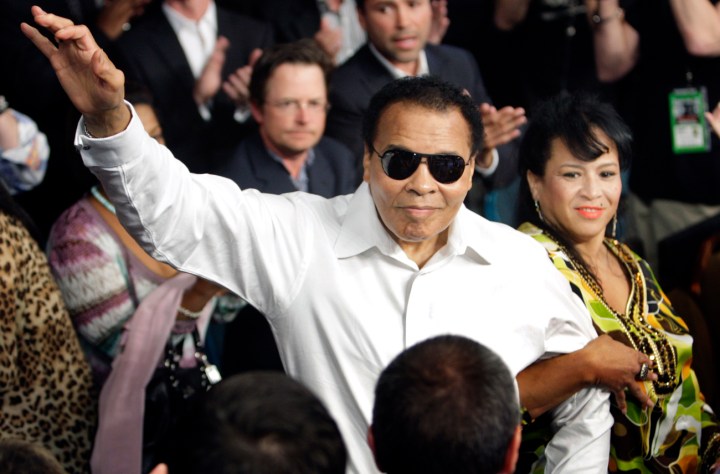As Muhammad Ali turns 70 on Tuesday, some commentators suggest that the ageing boxer’s career holds little resonance or interest for young people today. REBECCA DAVIS reminds us why the man they called “The Greatest” is one of the most famous people on Earth.
Describing Ali’s birthday party last Saturday – one of five planned parties to happen across the States over the next month – TIME suggested that even at age 70, Ali has “still the most recognisable face on the planet”. A touch of hyperbole? After all, the appeal of boxing has faded in recent years. The “golden age” of boxing is widely construed as stretching from the 20s to the late 70s, with blips in between. Most people who aren’t specifically interested in the sport these days could probably name less than a handful of currently-active professional boxers: maybe America’s Floyd Mayweather, perhaps the Philippines’ Manny Pacquiao, at a push, Ukrainian brothers Vladimir and Vitali Klitschko. A bout between Mayweather and now-retired Oscar De La Hoya in 2007 was billed as “the fight to save boxing”: an explicit acknowledgement of the sport’s declining popularity. Reasons posited for why this should be the case range from a lack of comprehensive drug testing within the sport to the emergence of more appealing forms of mixed martial arts; from a lack of interest at the amateur level to a paucity of media coverage.
But certainly another reason must be a shortage of larger-than-life characters along the lines of Ali. It’s fair to say that probably only one boxer has been as widely known as Ali in the years since Ali’s retirement: Mike Tyson, whose professional career was besmirched by allegations of domestic violence, a jail term for rape and of course that infamous bout against Evander Holyfield in 1996 when Tyson bit a chunk of Holyfield’s ear off. It is unlikely that Tyson will be described on his 70th birthday as a “prophet, a hero, a revolutionary”, to quote Ali’s great rival George Foreman this week.
Though Muhammad Ali’s boxing prowess was undisputed – a BBC poll voted him the greatest sportsperson of the millennium – a large part of his legend took place outside the ring, and his fame owed as much to his personality as his talent. Foreman went so far as to suggest to an English magazine this week “he only did boxing to run his mouth”. And boy, did he run that mouth. Aside from his rhyming trash-talking of opponents – “It will be a killer and a chiller and a thriller when I get the gorilla in Manila”, was what the poor Joe Frazier was subjected to – Ali was a fearsomely compelling orator. In another lifetime, it is not difficult to imagine him as a controversial politician. Recall his famous statement upon converting to Islam in 1964: “Cassius Clay is a slave name. I didn’t choose it and I don’t want it. I am Muhammad Ali, a free name. It means ‘beloved of God’, and I insist people use it when people speak to me.” He was also a master of the quick riposte: after being told by an Ohio restaurant in 1960 “We don’t serve niggers here,” he allegedly responded “That’s okay, I don’t eat ‘em.”
Possibly the sound bite Ali will be best remembered for, other than floating like a butterfly and stinging like a bee, was his 1967 explanation of why he refused to join the US armed services to fight in Vietnam. “I ain’t got no quarrel with them Vietcong,” he said. “No Vietcong ever called me nigger.” Ali was one of the first public figures to come out against the war, with his example reportedly inspiring Martin Luther King’s own opposition. History leads many of us to look favourably on Vietnam’s conscientious objectors like Ali. Yet in the current eulogising of the man that is accompanying his 70th birthday, it’s easy to forget that at one point he was the most hated figure in the US.
In the immediate aftermath of Ali’s statement, journalists around the country called for his boxing career to be forcibly ended. Pulitzer Prize-winning sportswriter Red Smith wrote in the New York World Tribune of 23 April 1967 “Squealing over the possibility that the military may call him up, Cassius makes himself as sorry a spectacle as those unwashed punks who picket and demonstrate against the war.” The New York Post’s Milton Gross said: “As a fighter, Cassius is good. As a man, he cannot compare to some of the kids slogging through the rice paddies where the names are stranger than Muhammad Ali.” For the New York Journal-American, Murray Robinson opined “For his stomach-turning performance, boxing should throw Clay out on his inflated head.” It should be noted that at this time, the man born Cassius Clay had been going by the name of Muhammad Ali for a full three years.
Ali was suspended from boxing for almost four years. In January 1970, the Observer’s Hugh McIlvanney essentially wrote his professional obituary. “There is a good reason to predict that one of the peripheral tragedies of the 1970s will be the fate of the Louisville negro who won the world heavyweight championship as Cassius Clay and then stumbled towards a kind of shabby martyrdom as Muhammad Ali,” he dolefully penned. “He claims to have come to terms with the premature ending of his career, to have found more meaningful work as a militant voice of negro protest. But any time I have come into contact with him […] he has, sooner or later in a quiet moment, exuded the resigned misery of a dancer who has been told he must lose a leg.” McIlvanney concluded that it was likely that Ali “will never box seriously again”. Ten months later, Ali returned to the ring to thrash Jerry Quarry in three rounds. He would box a further 30 fights between 1970 and 1981, of which he won 25.
To paraphrase Mark Twain, news of Ali’s demise in 1970 was thus greatly exaggerated. But if you’ve skimmed any of the coverage of Ali’s birthday this week, you may have noticed a similar trend happening today: the tendency for people to refer to him in the past tense. As if he were already dead, in other words. “Every time you met him, you knew you were meeting a very spiritual and a powerful man”, English former boxer Frank Bruno told the Evening Standard on Monday. More from George Foreman: “If you put Ali in boxing, you won’t get what he really was”. Al-Jazeera’s Sunday report on his birthday almost explicitly evoked the language of an obituary: “The boxing star’s dramatic life always grabbed media attention”, they wrote.
That is no doubt an inevitability attached to his condition: the Ali the world sees today is a frail shadow of his former vital self, unable to do much other than weakly wave. He is barely able to speak, which countless commentators have seized upon as the most tragic irony of his condition, given the man’s previous gift of the gab. There is disagreement on whether the Parkinson’s with which he is currently afflicted is linked to the estimated 29,000 punches he took to the head in his boxing career, with some doctors saying that he lacks the symptoms of what is known as “Dementia Pugilista”. Perhaps some of the reluctance to link his boxing career with his current condition is sentimental, however: it is no easy thing to consider that the man who made boxing look beautiful may also have been destroyed by it.
Even if it was boxing which took his health, Ali cannot escape the sport in his lifetime. It seems virtually impossible for journalists to avoid using boxing metaphors to describe his state. He has “fought Parkinson’s the way he fought the late Joe Frazier, never giving an inch”. He can “not simply knock out Parkinson’s syndrome”. He has “taken the fight of his life ever onward”. When he eventually dies, expect further references galore to knockouts.
Current responses to Ali, and particularly this tendency to speak of him as if already gone, are reminiscent of those directed to another figure associated with politics and boxing: our own Nelson Mandela. As is the case with Mandela, Internet-fuelled rumours swirl frequently as to Ali’s death (most recently in December). In both cases, the deaths seem simultaneously dreaded and viewed as bringing deserved peace to a turbulent life. With both, there is a sense that the legacy has already been agreed on, packaged and is ready to go, and that living individuals have already been fossilised as “icons”. Of course, comparisons between the two figures in other regards are specious, though Mandela is known to be a fan – in February last year the Sunday Times reported that the two photos given pride of place behind Mandela’s desk are pictures of Barack Obama and Muhammad Ali.
Saturday’s private party for Ali saw a group of 350 vastly diverse people gather to wish him well. Ali’s former trainer Angelo Dundee, now 90, rubbed shoulders with the likes of the three American hikers freed last year from detention in Iran, invited because Ali used his leverage as an American Muslim to lobby for their release. If this was one of Ali’s final appearances, it was fitting that the guest list reflected the twin threads of politics and boxing, interwoven throughout his life. DM
Read more:
- Muhammad Ali at 70, in the Daily Mirror;
- Ali: Anti-war icon, in the Morning Star;
- The Louisville Party: Happy 70th Birthday Muhammad Ali, in TIME.
Photo: Boxing legend Muhammad Ali stands with his wife Yolanda as he is introduced before the welterweight fight between Floyd Mayweather Jr. and Shane Mosley at the MGM Grand Garden Arena in Las Vegas, Nevada on May 1, 2010. REUTERS/Steve Marcus

















 Become an Insider
Become an Insider